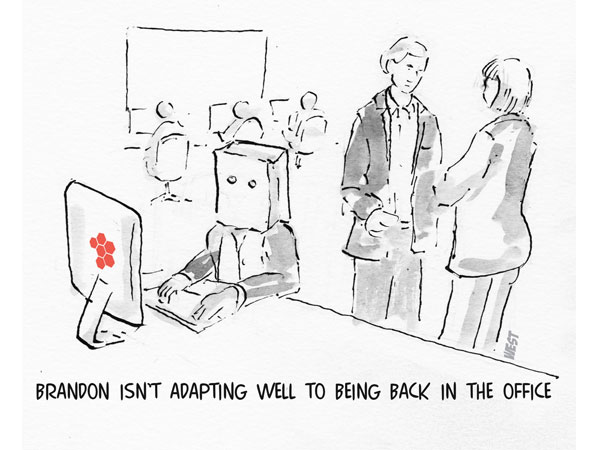
The seismic changes at work brought on by the pandemic are continuing. As a business leader you’re not only dealing with hybrid working and the Great Resignation, but there’s now a new trend, and it’s called ‘quiet quitting’.
What does it mean for your organisation?
These ‘quiet quitters’ continue to deliver all the regular work that’s expected of them, but they will ‘quietly’ dig their heels in when it comes to going above and beyond the bare minimum. They’ll work their allocated hours, and they’ll deliver the work that’s in their job description. But they’ll have their (virtual or otherwise) coat on at 5.30pm, they won’t volunteer for any projects that fall outside their remit, and they most definitely won’t join you and the team for a pizza on a Friday evening.
While there may be some jobs where it’s possible to define and articulate what’s expected of someone in that role, realistically most companies rely on a work force that’s willing to step up. This means taking on extra tasks from time to time and going the extra mile. Equally importantly, it means contributing something positive to the culture of the organisation and the support and morale of co-workers.
Citizenship behaviours
Researchers refer to going the extra mile and playing a part in the culture as ‘citizenship behaviours’.
These are obviously important for business, but they are also beneficial for the employees themselves. Their ‘quiet quitting’ is bad not only for your business but for both their own professional growth, and for their personal wellbeing.
‘Quiet quitting’ may be a new trend, but the problems of a ‘lack of engagement’ have always been there for business leaders. The pandemic has amplified this issue because people reflected on what they wanted from their lives. Simultaneously, working from home became the norm and the days of presenteeism were largely ended (thankfully in our view).
What can you do as a business leader about quiet quitting?
- Very often problems such as quiet quitting or a lack of engagement can feel very intangible to a leader. The first step therefore is for you to recognise the behaviour you’re seeing and become more aware and understanding of what’s happening.
- It’s unlikely that a ‘standard’ job description will help you solve this issue. When we talk to our clients about job descriptions, they usually tell us they are either in a drawer gathering dust or have become a very long and ever-increasing list of tasks.
- Neither of these makes for an engaged employee. We always recommend that the job description is evolved in such a way as to make it high-level and simple, really engaging for the person doing that role, and (most importantly) focused on successful deliverables for the business rather than a long list of activities.
- Next, to raise levels of engagement and invest in your employees you need to listen to them properly. This means finding the time and ring-fencing regular 1 to 1 meetings with them, to find out what their concerns and motivations are. These meetings are also the best opportunity you’ll have to coach them. By doing so, you will increase their levels of accountability and engagement, they’ll show more initiative, and they’ll take ownership of their job and pride in their performance.
- One size doesn’t fit all. Only by finding out what your employees uniquely need to be engaged can you really tailor your approach. Some may value career development opportunities, some may want flexibility around their working hours and some might be motivated by their bonus.
- You can make great progress with engagement by first listening to and understanding the ‘reward’ structure that is most motivational to any one individual, then flexing your management style.
The pandemic was a once in a lifetime event – the ‘black swan event’ that turned over working practices and there’s a tendency to think that ‘quiet quitting’ is a new phenomenon.
But the human condition is largely constant, and lack of engagement and doing the bare minimum have always been a challenge for leaders.
Undoubtedly the pandemic has made this more widespread, but if leaders can recognise the issue for what it is and focus on good management practice then (whisper it) the quiet quitters might not quietly quit…
If you’d like to discuss any of the issues raised, call us on 07770 221166 or email ab@leaderslab.co.uk.


About The Author: Amanda Baines
Amanda has a passion for turning ‘average’ into ‘excellent’. She delivers outstanding results through her dynamic coaching, consultancy and facilitation, producing organisations which maximise everyone’s potential and in which everyone plays to their strengths.
More posts by Amanda Baines